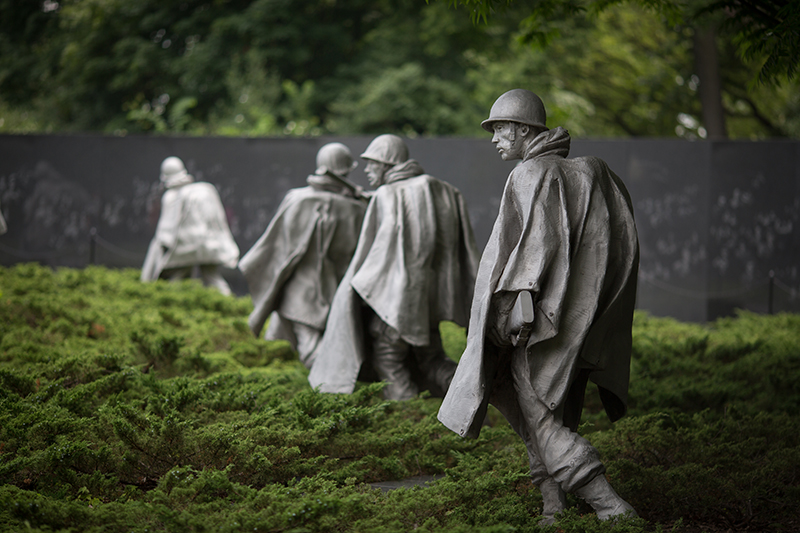Internal Riches Through Struggles and Suffering

“The night before my scheduled execution the bombs fell like rain in the monsoon season,” wrote the late Rev. Dr. Sun Myung Moon in his 2009 autobiography, As a Peace-Loving Global Citizen. “The bombing was so intense that it seemed all of Heungnam had been turned into a sea of fire. The high walls around the prison began to fall and the guards ran for their lives…”
The Korean War began 71 years ago today, on June 25, 1950, when North Korea invaded South Korea following clashes along the border. Nearly five million people were casualties of the war before it came to an end three years later. Today, let us remember the servicemen who fought for Korea’s freedom; the lives that were lost during this turbulent time; and the arduous course experienced by the Korean people including Family Federation for World Peace and Unification (FFWPU) co-founders, the late Rev. Dr. Sun Myung Moon and Dr. Hak Ja Han Moon.
Rev. Moon survived two-and-a-half years of brutality in Heungnam prison before being liberated by the bombs of advancing U.N. and U.S. forces in October 1950. In his autobiography, he described his experience, the conditions of war-torn Korea and the immense suffering of its people. It was also in the midst of the Korean War, at a shelter in Busan, that Rev. Moon penned the first draft of the Wolli Wonbon, the original version of the Divine Principle, which became the core teaching of the global interfaith Unification movement.
Below is an excerpt from the third chapter of Rev. Moon’s autobiography, “Internal Riches Through Struggles and Suffering,” detailing the harrowing reality of the Korean War and rebuilding his ministry.
We arrived finally on January 27, 1951… Busan was filled with refugees from the North. It felt like the whole country had gathered there. Any accommodation fit to live in was already occupied. Our tiny place had barely enough room to sit. Our only option was to go into the woods at night, keeping warm as best we could, and then return to the city by day to look for food…
We had nothing and even had to beg for food, but a warm friendship always flowed among us… Up to that point, I had never shared my heart candidly with any of my friends. But in the home of Duk Mun Eom, I shared my story for the first time. I spoke throughout the night. I told him of my encounter with God, crossing the 38th parallel, starting a church, and surviving Heungnam prison…
I found lodging in a shelter for labourers… [in my room] I sharpened a pencil and solemnly wrote the first draft of the Wolli Wonbon (the original version of the Divine Principle). I was financially destitute, but this was of no importance to me. Even living in a slum, there is nothing a determined soul cannot do. All we need is the will…
When we built the mud-walled house and began the church in Beomnetgol, there were only three people to hear me preach… By 1953, the persecution [from established churches] had become extreme. We closed the hut in Busan and moved first to Daegu and then to Seoul… In particular, unification represents my purpose to bring about God’s ideal world. Unification is not union. Union is when two things come together. Unification is when two become one. “Unification Church” became our commonly known name later, but it was given to us by others…
My hope was for the rise of a church without a denomination. True religion tries to save the nation, even if it must sacrifice itself. It tries to save the world, even at the cost of sacrificing the nation. And it tries to save all humanity, even if it means sacrificing the world. In this understanding, there can never be a time when the denomination takes precedence.
The Korean War ended on July 27, 1953 when the Korean Armistice Agreement was signed. But despite leaders creating the Korean Demilitarized Zone (DMZ), there was no peace treaty between the two Koreas, which are still technically engaged in a frozen conflict. Natives of North Korea, Rev. and Dr. Moon dedicated their lives to reunifying the Korean Peninsula, defeating the God-denying ideology of communism, and bringing about a world of lasting peace as one global human family centered on God.
Today let’s honor and remember the sacrifices made by those affected by the Korean War and the immeasurable impact it has had on so many lives.
You can get a copy of Rev. Moon’s autobiography here.
Comments are welcomed and encouraged on this site, but there are some instances where comments will be edited or deleted. Please see our comments policy here.

James L Chide
| #
My Father fought in the Korean War and spoke of the tragedy he saw and the soldiers he saw die on the battlefield. I am proud my Father was part of fighting for freedom of South Korea and True Father. I was born when he returned home from battle.
Reply
Don Marsolek
| #
If there is a Korean War Memorial in your area, it would be fitting to visit and offer prayers. You may well meet some veterans of the Korean War.
Reply